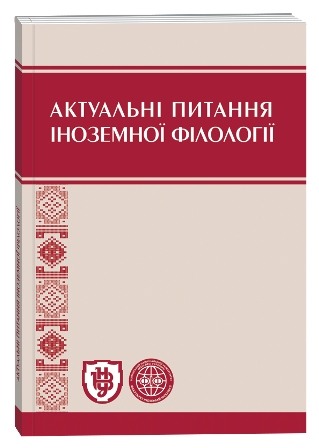EFFECTIVE TOOLS DEALING WITH PROBLEMS OF ADEQUATE ONLINE ASSESSMENT OF STUDENTS’ FOREIGN LANGUAGE KNOWLEDGE IN HIGHER EDUCATION ESTABLISHMEMTS
DOI:
https://doi.org/10.32782/2410-0927-2021-15-5Keywords:
distance learning, innovative technologies, assessment tools, online learning, online assessmentAbstract
Online assessment of students’ foreign language skills is the collected information about what students know and are able to do so that we can take the correct actions during teaching and understand how successfully they have completed the course. However, deciding how best to assess students’ foreign language skills can be difficult, especially when we and our students have distance learning and try to adapt to unfamiliar learning environments and use new technologies. In this article we will consider the relevant tools for online assessment of students’ foreign language skills in higher education establishments. We rely on final assessment approaches to show what students have achieved, an assessment that focuses on monitoring student progress as a way to support their learning. The basic principles of assessment of students’ foreign language skills are the same in any context, and distance assessment is often a matter of adapting the standart assessment. In the context of globalization, foreign language teachers constantly feel the need to improve their skills and abilities to work with Internet tools, the use of which has a positive impact on the quality of learning and the development of foreign language competence of students in higher education. It is emphasized that the establishing of an electronic assessment system of students’ foreign language knowledge is a topical issue. This system will be able to provide effective confirmation of the student`s identity and his/her authorship through the integration of modern technology. It is noted that the system of personal identification during e-assessment enables to provide a transparent and user-friendly e-assessment process for online learning based on a variety of learning environments and platforms. Moreover, the use of effective tools for solving the problems of adequate online assessment of students’ foreign language skills and innovative technologies in the learning process allows to increase self-confidence, motivation to learn foreign language and to organize students’ self-cognitive activities more effectively. Distance learning is perspective in a view of the increasing lifelong learning trend and is cost-effective for educational establishments, etc. In this context, the quality of the learning environment and the use of modern approaches to the assessment of foreign language competence become especially important. The article deals with the main tools for e-assessment and the information of effective implementation of various tools for assessing foreign language skills of students in higher establishments: CloudApp, GoogleDocs, Google forms, Quizlet, Screencast-o-matic, Socrative, Weebly, WordPress and others.
References
Задорожна Н., Середа Х., Тебенко О. Методика і технологія керування інформаційним наповненням освітніх сайтів. Інформаційні технології і засоби навчання: електронне наукове фахове видання. 2008. № 3 (7). Режим доступу: http://www.nbuv.gov.ua/e-journals/ITZN/em7/emg.html
Захар О. Г. Використання Інтернет-технологій у процесі підвищення кваліфікації вчителів. Комп’ютер у школі та сім’ї. 2014. № 5 (117). С. 7–10.
Захар О. Використання соціальних інтернет-сервісів у процесі підвищення кваліфікації вчителів. Науковий часопис НПУ ім. М. П. Драгоманова. Серія № 5. Педагогічні науки: реалії та перспективи. Збірник наукових праць. Заг. ред. проф. В. Д. Сиротюка. К. : Вид-тво НПУ ім. М. П. Драгоманова. 2013. Вип. 42. С. 87–93.
Осіпа Р. Інформаційно-комп’ютерні технології в освіті. Навч. Посібник. К. : Міленіум. 2005. 78 с.
Персональний сайт вчителя, данина моді чи потреба. Методична скарбничка: веб-сайт. URL: http://techerworldlit.at.ua/publ/metodichna_skarbnichka/personalnij_sajt_vchitelja_danina_modi_chi_potreba/10-1-0-96 (дата звернення: 22.01.2022).
Дистанційне навчання у закладах вищої освіти: ризики та перспективи розвитку. НУБіП: веб-сайт. URL: https://nubip.edu.ua/node/100736 (дата звернення: 20.01.2021).
Проблеми та перспективи розвитку системи вищої освіти в Україні. Матеріали Всеукраїнської науково-методичної інтернет-конференції 15 жовтня 2020. URL: https://kstuca.kharkov.ua/wp-content/uploads/2020/12/Sobr_soch_probl_osv_2020.pdf (дата звернення: 19.01.2022).
Цифрові інструменти Google для використання у викладацькій і науковій діяльності опановують викладачі університету. НУХТ: веб-сайт. URL: https://nuft.edu.ua/news/podiyi/czifrovi-instrumenti-google-dlya-vikoristannyau-vikladaczki (дата звернення: 15.01.2021).
15 цифрових інструментів для формативного оцінювання учнів. Нова освіта: веб-сайт. URL: https://osvitanova.com.ua/posts/4306-15-tsyfrovykh-instrumentiv-dlia-formatyvnoho-otsiniuvannia-uchniv (дата звернення: 27.12.2021).
Щодо організації дистанційного навчання. Лист МОН № 1/9-609 від 02.11.20 року. URL: https://osvita.ua/legislation/Ser_osv/77298/ (дата звернення: 22.01.2021).
Онлайн-інстумент SELFIE масштабують на всю систему загальної середньої та професійної освіти. МОН: веб-сайт. URL: https://mon.gov.ua/ua/news/onlajn-instrument-selfie-masshtabuyut-na-vsyu-sistemu-zagalnoyiserednoyi-ta-profesijnoyi-osviti (дата звернення: 21.01.2021).







